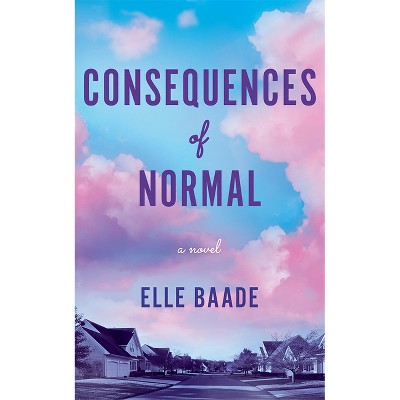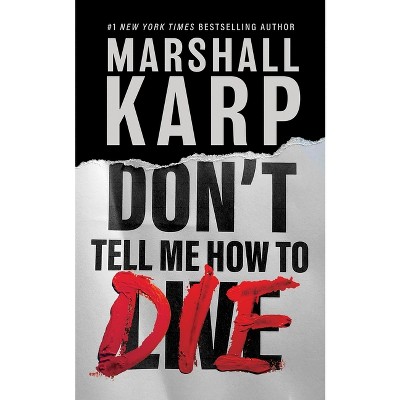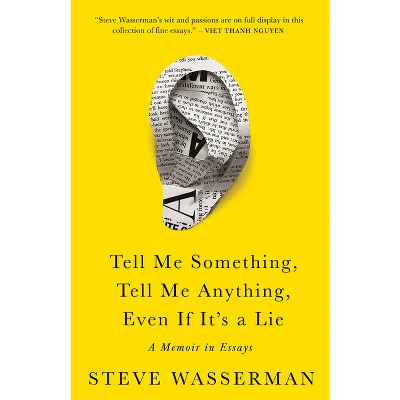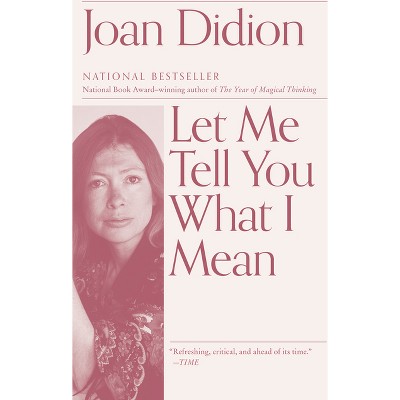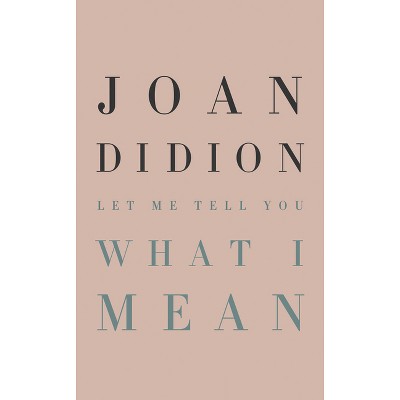Sponsored

How to Tell When We Will Die - by Johanna Hedva (Paperback)
$17.79Save $0.21 (1% off)
In Stock
Eligible for registries and wish lists
Sponsored
About this item
Highlights
- "A book for the moment and for the ages.
- About the Author: Johanna Hedva (they/them) is a Korean American writer, artist, and musician, who was raised in Los Angeles by a family of witches, and now lives in LA and Berlin.
- 384 Pages
- Literary Collections, Essays
Description
Book Synopsis
"A book for the moment and for the ages. It's questing, pissed, propulsive, funny, generous, pervy, and original--full of love and pain in all their entwined glory." --Maggie Nelson, author of The ArgonautsWINNER OF THE AMBER HOLLIBAUGH AWARD FOR LGBTQ+ SOCIAL JUSTICE WRITING
The long-awaited essay collection from one of the most influential voices in disability activism that detonates a bomb in our collective understanding of care and illness, showing us that sickness is a fact of life.
In the wake of the 2014 Ferguson riots, and sick with a chronic condition that rendered them housebound, Johanna Hedva turned to the page to ask: How do you throw a brick through the window of a bank if you can't get out of bed? It was not long before this essay, "Sick Woman Theory", became a seminal work on disability, because in reframing illness as not just a biological experience but a social one, Hedva argues that under capitalism--a system that limits our worth to the productivity of our bodies--we must reach for the revolutionary act of caring for ourselves and others. How to Tell When We Will Die expands upon Hedva's paradigm-shifting perspective in a series of slyly subversive and razor-sharp essays that range from the theoretical to the personal--from Deborah Levy and Susan Sontag to wrestling, kink, mysticism, death, and the color yellow. Drawing from their experiences with America's byzantine healthcare system, and considering archetypes they call The Psychotic Woman, The Freak, and The Hag in Charge, Hedva offers a bracing indictment of the politics that exploit sickness--relying on and fueling ableism--to the detriment of us all. With the insight of Anne Boyer's The Undying and Leslie Jamison's The Empathy Exams, and the wit of Samantha Irby, Hedva's debut collection upends our collective understanding of disability. In their radical reimagining of a world where care and pain are symbiotic, and our bodies are allowed to live free and well, Hedva implores us to remember that illness is neither an inconvenience or inevitability, but an enlivening and elemental part of being alive.
Review Quotes
WINNER OF THE AMBER HOLLIBAUGH AWARD FOR LGBTQ+ SOCIAL JUSTICE WRITING "In these sharp essays, novelist Hedva reflects on living with chronic illness . . .They push back against misogynistic associations between illness and a concept of femininity defined by weakness and fragility, instead asserting that "you don't need to be fixed, my queens--it's the world that needs the fixing." Hedva's philosophical takes on disability are consistently illuminating, even if the subject matter makes for heavy reading . . . Probing and sophisticated, this is worth seeking out." --Publishers Weekly "This is a book for the moment and for the ages. It's questing, pissed, propulsive, funny, generous, pervy, and original--full of love and pain in all their entwined glory. Hedva lays waste to solidarity and care as buzzwords and returns them to us enlivened with all the blood and paradox they deserve. I will be thinking in the wake of this important collection for a long time, no doubt alongside so many grateful others." --Maggie Nelson, author of The Argonauts "Invites the reader into an ecstatic circle dance in order to generate expansive approaches to talking about disability, illness, care, sex, and community." --Lily Kwak, Interview magazine "Hedva, a committed reader of queer and female artists, creates, in reaction to their influences, a new construction of themself: a nonbinary and Asian disabled intellectual, as a lens through which to see the world. By centering their experiences into a cohered perspective, they make a contribution on the fronts of fragility and rage, justice and systems, desire and limitation that expands pre-existing frameworks for conceptualizing human experience." --Sarah Schulman, author of Let the Record Show: A Political History of ACT UP New York, 1987-1993
"Johanna Hedva's new book How To Tell When We Will Die is monstrous good. How did they write the most metal kink crip book about death, survival, crip viscera and reality ever that we need right now? This book is for grown up runaways who stay feral and awake in theafterfuture we inhabit, people who desire and are rare delights, anyone with a body or a mind of any kind, the crips who GET IT and NEED IT and everyone else who does too. It's exactly what we need right now and goes so beyond the 101 that it blew my brain out of my ears. As we live into the disabled future and claim our crip crone crowns, this book is delicious required reading." --Leah Lakshmi Piepzna-Samarasinha, author of The Future Is Disabled
"A tremendous work of thought and feeling, packed with profound insight and illuminated throughout with a radical vulnerability that transmutes before your eyes into phenomenal power. Important and revelatory." --Michelle Tea, PEN-award winning author of Against Memoir: Complaints, Confessions & Criticisms "Like many, I have been waiting patiently for Johanna Hedva's essay collection and How to Tell When We Will Die comes now at the perfect moment in the culture. A decade in the making, Hedva adds to and updates the classics of their oeuvre--but the book goes beyond even that. We journey from their body and mind to learning about their mother, ancestors, relationship to biculturalism in all its forms, their take on queerness and its intersection with illness. There is so much beauty and horror and tenderness and humor and mysticism in these pages that reading it feels like living infinite lifetimes within the topic dearest to me, that should be dearest to everyone. This transcendent collection operates like a kaleidoscope of memoir, manifesto, cultural criticism, even found object, and how Hedva tackles and untangles every aspect of their identity made me feel like just maybe the people I am rooting for most will win in the end!" --Porochista Khakpour, author of Sick: A Memoir
"How to Tell When We Will Die is a book that will rearrange you. With breathtaking candor and rigorous insight, Johanna Hedva offers a manifesto for accessibility as a meticulous practice of remaking the world. At the same time, Hedva refuses the clarity of any template that doesn't allow for the complications of desire and need, kink and care, illness as part of insurrection. Granular and kaleidoscopic in its relentless search for embodied truth, this book twists and turns in pain and ecstasy, shifting form to make room for revelation." --Mattilda Bernstein Sycamore, author of Touching the Art "Hedva's writing and vision acknowledges hard realities as much as it celebrates joy and being, questions as much as it empathizes, quotes Susan Sontag and references astrology alike. From start to finish, their voice is a sincere and passionate disruption to the status quo. How to Tell When We Will Die is surely the beginning of a long, thoughtful, rebellious, doom metal dialogue that will take us all to a new and wonderful place." --Hillman Grad Books
About the Author
Johanna Hedva (they/them) is a Korean American writer, artist, and musician, who was raised in Los Angeles by a family of witches, and now lives in LA and Berlin. Their first novel On Hell was named one of Dennis Cooper's favorites of 2018, with their second novel Your Love Is Not Good released in 2023, and their writing has been published in Triple Canopy, frieze, and The White Review. Their artwork has been shown at the Institute of Contemporary Arts, London; Performance Space New York; the Museum of Architecture and Design, Los Angeles; and the Museum of Contemporary Art on the Moon. In 2019, they released the album The Sun and the Moon, and in 2020 they released Minerva the Miscarriage of the Brain, a collection of poetry, plays, and essays published by Sming Sming and Wolfman Books.Dimensions (Overall): 8.0 Inches (H) x 5.4 Inches (W) x 1.2 Inches (D)
Weight: .75 Pounds
Suggested Age: 22 Years and Up
Number of Pages: 384
Genre: Literary Collections
Sub-Genre: Essays
Publisher: Hillman Grad Books
Format: Paperback
Author: Johanna Hedva
Language: English
Street Date: September 23, 2025
TCIN: 1006040404
UPC: 9781638933533
Item Number (DPCI): 247-29-3465
Origin: Made in the USA or Imported
If the item details aren’t accurate or complete, we want to know about it.
Shipping details
Estimated ship dimensions: 1.2 inches length x 5.4 inches width x 8 inches height
Estimated ship weight: 0.75 pounds
We regret that this item cannot be shipped to PO Boxes.
This item cannot be shipped to the following locations: American Samoa (see also separate entry under AS), Guam (see also separate entry under GU), Northern Mariana Islands, Puerto Rico (see also separate entry under PR), United States Minor Outlying Islands, Virgin Islands, U.S., APO/FPO
Return details
This item can be returned to any Target store or Target.com.
This item must be returned within 90 days of the date it was purchased in store, shipped, delivered by a Shipt shopper, or made ready for pickup.
See the return policy for complete information.
Frequently bought together
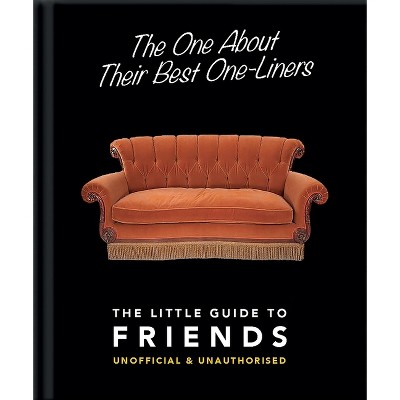
$8.06
MSRP $8.95
Buy 1, get 1 50% off select books
5 out of 5 stars with 1 ratings









